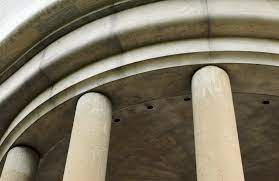There is a classic Jewish teaching that has become mainstream to such an extent that, I believe, it rarely gets the full contemplation it deserves. Yet, in our current day and age, when many of society’s building blocks are being tested and undermined like never before, I’ve found solace in the truths it contains.
The teaching is attributed to Shimon HaTzadik — Shimon the Righteous — in the second chapter of Pirkei Avot, our sages’ timeless collection of Jewish ethical wisdom.
“Upon three things the world stands: on the Torah, on the avodah (worship), and on the performance of gemilut chasadim (acts of lovingkindness).”
Growing up, I remember encountering this seemingly ubiquitous statement at school, where I saw it painted on outdoor murals and plastered on classroom walls. At home, my family displays several tzedakah boxes with its perennial words engraved on the edges.
Suffice it to say, however, my understanding of Shimon HaTzadik’s teaching has evolved since my early childhood. I have come to believe that Shimon’s HaTzavidik’s teaching should be understood in a largely literal sense. Absent the three components of Torah, avodah, and gemilut chasadim, the world would simply be unable to sustain itself.
At first glance, Shimon HaTzadik’s promotion of his “big three” tenets seems to be inherently Jewish — after all, Torah, avodah, and gemilut chasadim are values particular to Judaism and its moral credo. Yet, I believe that Shimon HaTzadik’s words have an even greater, universal implication: Without Shimon HaTzadik’s three pillars, our entire civilization, as we know it, would cease to exist.
The Torah — in Hebrew, “instruction” — serves as a moral and existential beacon, framing the human experience with essential context and meaning. “For the commandment is a lamp, and the teaching (Torah) is a light,” states the enduring proverb. Weaving threads of the past, the present, and the future into its covenantal tapestry, the Torah illuminates a path to dignified living.
From an axiological perspective, the Torah introduced the institutions and the core principles that ultimately govern our civilization. The Torah educated us about the dignity of mankind, the sanctity of life, the supremacy of law, and the intrinsic values of concepts such as truth and knowledge. Before any other document or code of conduct, the Torah held these truths to be self-evident.
The Torah defined, but also enshrined, the notion of morality into the human consciousness. Thousands of years ago, Isiah had prophesied: “The grass withers, and the flowers fade, but the word of our God endures forever.” Regardless of the external circumstances, the vicissitudes of empires, cultural changes, natural disasters or other factors, the Torah promulgated the notion of a context-independent morality.
Furthermore, it is the avodah — in English, the worship, or service — that enables us, as mortal creations, to establish a meaningful dialogue with our Creator. The avodah transforms our positive, factual existence, into a normative, enlightened one, and integrates the physical and spiritual elements of the human experience. The avodah reflects the wondrous contemplation of the Psalmist — “And you made [man] little less than divine” — and endows us with our sacred identity: beings created in the image of God.
An additional interpretation of the essence of the avodah extends to its broader translation: work. This view traces back to one of God’s initial communications to mankind — His hallowed instruction “to work, l’avod, and to guard the land.” The avodah, in this sense, represents mankind’s responsibilities contained within our covenantal partnership with God.
At their core, acts of lovingkindness — gemilut chasadim — are an expression of the noble form of our humanity. Fundamentally, performing such acts of chessed allow individuals to transcend the multitude of biological and material constraints imposed on us. They allow the self to give, to sacrifice, to love — and ultimately to defeat the selfish and inexorable Darwinian struggle for existence.
Acts of chessed, moreover, iterate our indebtedness and dependence on others, and affirm our individual places in a faith-based community. This directive of gemilut chasadim charges us to pursue the Prophets’ lofty visions of peace, justice, and fellowship.
It may not have been obvious to me when I was younger, but as I think of the words of Shimon HaTzadik now, I am amazed at the profundity and the accuracy of his wisdom. These tenets — Torah, avodah, and gemilut chasadim — are, perhaps, the very fulcrum of our entire civilization.
Many generations ago, the Psalmist had lamented “when the foundations are destroyed, what can the righteous do?” Shimon Hatzadik, through his timeless insight, provided a resilient answer. We should reinforce our dedication to the three pillars holding up our world: Torah, avodah, and gemilut chasadim.

